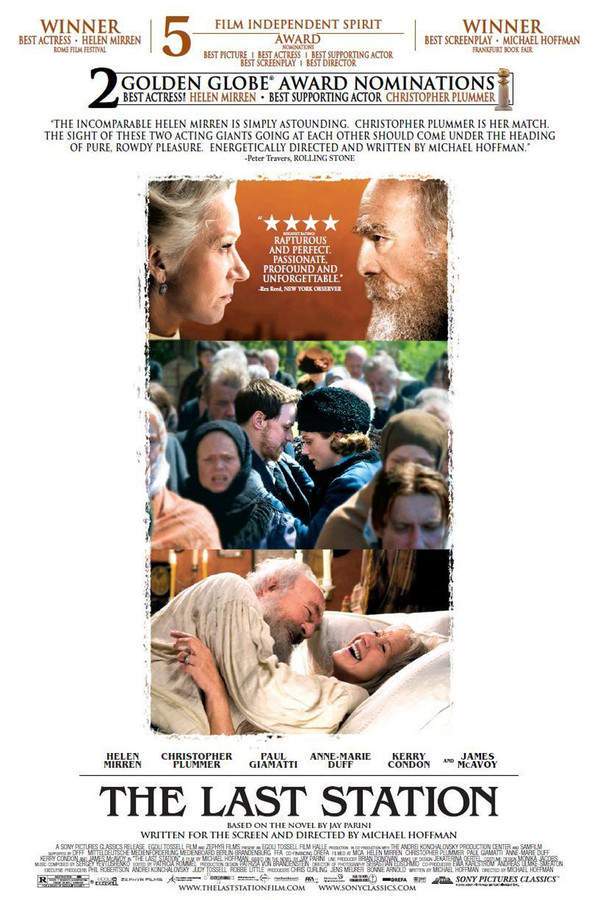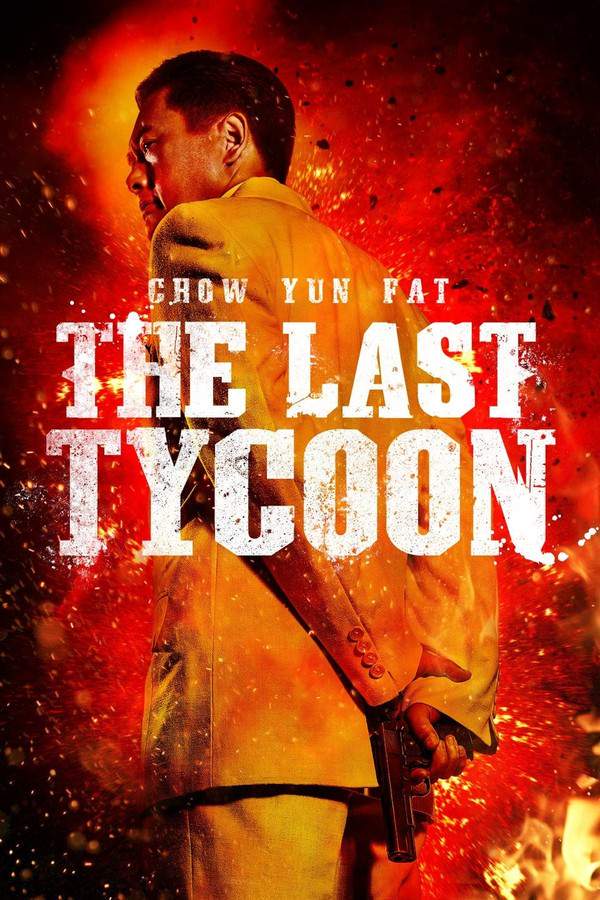
The Last Station 2009
Directed by

Michael Hoffman
Made by

Sony Pictures Classics
Test your knowledge of The Last Station with our quiz!
The Last Station Plot Summary
Read the complete plot summary and ending explained for The Last Station (2009). From turning points to emotional moments, uncover what really happened and why it matters.
In 1910, the final year of Leo Tolstoy’s life, his loyal disciples, led by Vladimir Chertkov, engage in a strategic battle against his wife, Sofya, striving for control over Tolstoy’s literary legacy after his passing. The story unfolds at the enchanting Tolstoy estate in Yasnaya Polyana, where the dynamic between Tolstoy and Sofya, shaped by a long and intense marriage, reveals the deeper conflicts between his spiritual philosophies and her aristocratic, traditional beliefs.
The core of the struggle revolves around a newly proposed will. The “Tolstoyans” aim to convince him to sign it, a document that would place all his copyrights into the public domain, effectively leaving his family without the financial support they need. This intricate power play is portrayed through the perspective of Valentin Bulgakov, Tolstoy’s newly appointed secretary, who becomes entangled in the tension, acting as a mediator between two opposing factions. Additionally, he embarks on a romantic relationship with one of the Tolstoyans named Masha.
As the story progresses, Tolstoy ultimately agrees to sign the contentious will and embarks on a journey to a secretive location where he can pursue his writing in solitude. In the aftermath of his departure, Sofya finds herself in a state of despair, leading her to a desperate attempt at suicide. Meanwhile, while on the road, Tolstoy’s health begins to decline. The film crescendos at the Astapovo railway station, where Sofya is granted a fleeting chance to see him in his final moments. The narrative concludes with the poignant note that by 1914, the Russian Senate restored the copyrights of Tolstoy’s works to Sofya, cementing her as the protector of his literary legacy.
“I know that I’m going to die.”
The Last Station Timeline
Follow the complete movie timeline of The Last Station (2009) with every major event in chronological order. Great for understanding complex plots and story progression.
Tolstoy in 1910
The year is 1910, marking the final phase of Leo Tolstoy's life. His health is declining, and the tension surrounding his literary legacy begins to escalate between his supporters and his wife.
Disciples vs. Sofya
Tolstoy's loyal disciples, led by Vladimir Chertkov, engage in a strategic battle against his wife, Sofya. This conflict centers around the control of Tolstoy's literary works as they negotiate what will happen after his passing.
Proposed Will
A crucial element of the struggle revolves around a proposed will that Tolstoy is asked to sign. This document would relinquish all his copyrights to the public domain, threatening the financial security of his family.
Valentin Bulgakov's Role
Valentin Bulgakov, Tolstoy's new secretary, becomes a central character in the unfolding conflict. He is positioned as a mediator between the opposing factions, trying to balance the demands of both Tolstoy's followers and his wife.
Romance with Masha
Amidst the strife, Bulgakov develops a romantic relationship with Masha, one of the Tolstoyans. This relationship adds a personal layer to the already complex dynamics at play.
Tolstoy's Decision
Ultimately, Tolstoy agrees to sign the contentious will, a decision that sends shockwaves through his family and supporters. This act highlights his commitment to his spiritual philosophies and the impact of his choices on his loved ones.
Journey for Solitude
After signing the will, Tolstoy embarks on a journey to a secretive location, seeking solitude for his writing. This trip indicates his desire to escape the pressures of his domestic life and focus on his work.
Sofya's Despair
In the aftermath of Tolstoy's departure, Sofya falls into a deep state of despair. Overwhelmed with grief and frustration, she contemplates a desperate act of suicide, illustrating her emotional turmoil.
Tolstoy's Declining Health
While on the road to his secluded destination, Tolstoy's health continues to decline steadily. This deterioration raises concerns for both his disciples and his family about his well-being and potential mortality.
Final Moments at Astapovo
The film reaches a climax at the Astapovo railway station, where Sofya gets a fleeting chance to see Tolstoy in his final moments. This poignant reunion encapsulates the tension and love that permeated their relationship.
Sofya's Legacy Restored
By 1914, the Russian Senate restores the copyrights of Tolstoy's works to Sofya. This decision cements her role as the protector of his literary legacy, contrary to the intentions of his disciples.
Tolstoy's Final Words
Tolstoy's recognition of his imminent death is captured with the haunting line, 'I know that I'm going to die.' This acknowledgment signifies the end of an era and the culmination of his life's work.
Impact on followers
The outcome of the battle over Tolstoy’s legacy profoundly impacts both his disciples and family. The emotional repercussions of his decisions and the public domain status of his works linger long after his passing.
Tension in Relationships
The intricate power dynamics and personal relationships explored during this time highlight the intersection of art, legacy, and personal conflicts. Tolstoy’s relationships ultimately shape the narrative of his life and works.
The Last Station Characters
Explore all characters from The Last Station (2009). Get detailed profiles with their roles, arcs, and key relationships explained.
Leo Tolstoy
Leo Tolstoy, a titan of literature, is portrayed as a complex individual torn between his spiritual beliefs and familial obligations. As he nears the end of his life, his decisions reflect profound philosophical conflicts, with his struggle for personal autonomy sharply depicted. His legacy as a writer hangs in the balance as he navigates the turmoil around him.
Sofya Tolstaya
Sofya Tolstaya is depicted as a passionate and heartbroken woman, fiercely devoted to her husband but deeply distressed by the fallout of his philosophies on their life. Her struggle to maintain her family's legacy highlights the inner turmoil of a woman caught between love and duty. Her desperation leads to tragic consequences, revealing the vulnerability behind her strength.
Valentin Bulgakov
Valentin Bulgakov, Tolstoy's secretive and devoted new secretary, serves as a bridge between the conflicting parties. He is torn between his admiration for Tolstoy and his own feelings for Masha. His character embodies the struggles of youth amid the larger ideological battles, as he seeks to navigate love while being engulfed in the drama surrounding the great writer.
The Last Station Settings
Learn where and when The Last Station (2009) takes place. Explore the film’s settings, era, and how they shape the narrative.
Time period
1910
The year 1910 was marked by significant social and political upheaval in Russia, paralleling the personal turmoil surrounding Tolstoy's family. This period witnessed the struggle between progressivism and conservatism, with Tolstoy himself representing the philosophical debates of his time. The events leading up to his death encapsulated the clash between artistic legacy and familial loyalty.
Location
Yasnaya Polyana, Astapovo railway station
Yasnaya Polyana is the enchanting estate where Leo Tolstoy spent much of his life, known for its picturesque landscapes and rich literary history. It served as a backdrop for spiritual and philosophical dialogues, embodying the conflicts between traditional values and modern ideologies. The Astapovo railway station becomes a crucial location, marking the final moments of Tolstoy's life and underscoring the emotional tensions between his family and followers.
The Last Station Themes
Discover the main themes in The Last Station (2009). Analyze the deeper meanings, emotional layers, and social commentary behind the film.
📝
Legacy
The theme of legacy is central to 'The Last Station', as various factions vie for control over Tolstoy's literary treasures. This struggle highlights the tension between the desire for public good and personal need, as Sofya fights to preserve her family's financial stability. Ultimately, it raises profound questions about what it means to truly own one's work in the face of death.
💔
Love & Betrayal
The intertwining relationships reveal themes of love and betrayal, particularly within the context of Tolstoy's marriage to Sofya. Their long, intense partnership is fraught with conflict as personal beliefs clash with emotional needs. The film explores how love can drive individuals to desperate acts, resulting in heart-wrenching consequences.
✍️
Artistic Freedom
Artistic freedom arises as a key theme, illustrated through Tolstoy's yearning to write away from the pressures of his family and followers. This reflects a broader struggle for self-expression against societal expectations. The will's implications challenge the very essence of artistic integrity, questioning who has the right to dictate the narrative of a creative life.

Coming soon on iOS and Android
The Plot Explained Mobile App
From blockbusters to hidden gems — dive into movie stories anytime, anywhere. Save your favorites, discover plots faster, and never miss a twist again.
Sign up to be the first to know when we launch. Your email stays private — always.
The Last Station Spoiler-Free Summary
Discover the spoiler-free summary of The Last Station (2009). Get a concise overview without any spoilers.
In the waning years of Imperial Russia, the sprawling estate of Yasnaya Polyana becomes a quiet stage for a cultural shift as the world watches the literary titan Leo Tolstoy ascend to global fame. The film captures the rustle of autumn leaves and the hushed murmur of intellectual salons, painting a portrait of a society caught between entrenched aristocracy and the restless yearning for deeper spiritual truth. Light filters through heavy drapes, and the air is thick with the perfume of old books, setting a contemplative tone that invites viewers to linger on the unspoken tensions of the era.
At the heart of the story lies the complex marriage of Leo Tolstoy and Sofya, Countess of a distinguished lineage. As Tolstoy begins to renounce the comforts of his privileged position, seeking a more austere and purposeful existence, Sofya grapples with the practical demands of preserving her family’s future and the legacy that their name commands. Their dialogue crackles with fierce determination on one side and unwavering artistic devotion on the other, each striving to reconcile love with divergent ideals. Adding to the intricate dance is the subtle, persuasive presence of Vladimir Chertkov, whose ideas and ambitions ripple through the household, hinting at the power of influence without ever overtly revealing its full reach.
Enter Valentin Bulgakov, the newly appointed secretary whose fresh perspective places him at the crossroads of these competing worlds. Tasked with assisting Tolstoy’s literary endeavors, he becomes an unwitting conduit between the passionate convictions of the husband, the protective instincts of the wife, and the ideological currents swirling around them. Amidst the scholarly atmosphere, a tender, tentative romance blossoms with a young Tolstoyan named Masha, offering a quieter counterpoint to the surrounding turmoil. The film’s mood is one of measured elegance, tinged with an undercurrent of inevitable change, inviting the audience to ponder how personal convictions shape—and are shaped by—the legacy they strive to protect.
Can’t find your movie? Request a summary here.
Movies with Similar Twists and Themes
Uncover films that echo the narrative beats, emotional arcs, or dramatic twists of the one you're exploring. These recommendations are handpicked based on story depth, thematic resonance, and spoiler-worthy moments — perfect for fans who crave more of the same intrigue.
Featured on this page

What's After the Movie?
Not sure whether to stay after the credits? Find out!
Explore Our Movie Platform
New Movie Releases (2026)
Famous Movie Actors
Top Film Production Studios
Movie Plot Summaries & Endings
Major Movie Awards & Winners
Best Concert Films & Music Documentaries
Movie Collections and Curated Lists
© 2026 What's After the Movie. All rights reserved.








